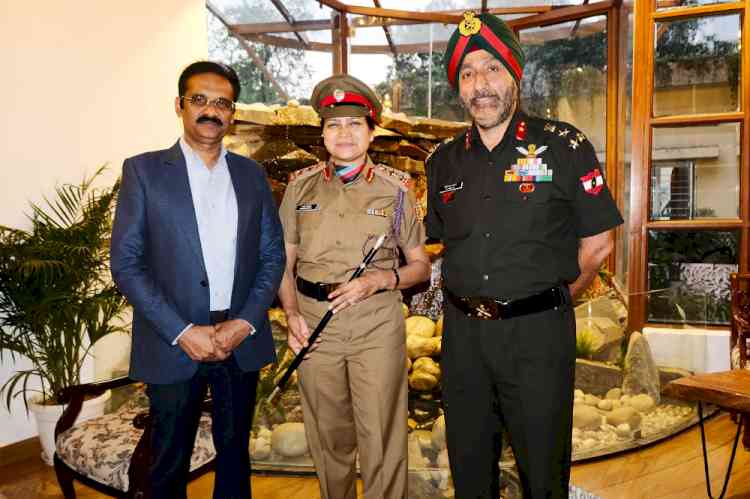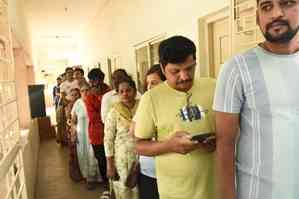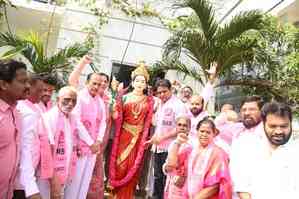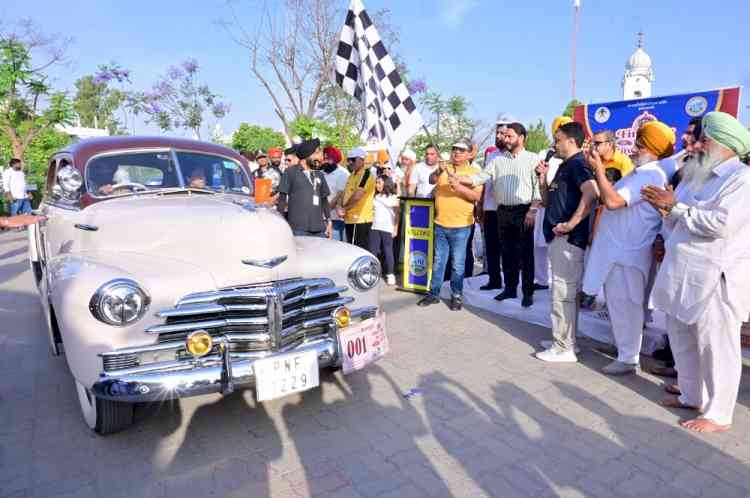Max Hospital conducts 100 successful renal transplants
Author(s): City Air NewsDr Vinay Sakhuja (2nd from left), Director & Head, Nephrology & Transplant Medicine, Dr Munish Chauhan (extreme left), Senior consultant, Nephrology and Dr Sananda Bag (3rd from left), Senior consultant, Renal Transplant...


Dr Vinay Sakhuja (2nd from left), Director & Head, Nephrology & Transplant Medicine, Dr Munish Chauhan (extreme left), Senior consultant, Nephrology and Dr Sananda Bag (3rd from left), Senior consultant, Renal Transplant Surgeon & Urologist and Dr Jagdish Sethi (2nd from right) Consultant Renal Transplant during the announcements of 100 successful renal transplants performed at Renal Transplant Centre of Max Super Specialty Hospital, Mohali at a hotel in Chandigarh on Thursday.
Chandigarh, September 4, 2014: Max Super Specialty Hospital (MSSH), Mohali has conducted 100 successful renal transplants at its Renal Transplant Centre. While announcing this milestone during a press conference held at a hotel in Sector 43 here today the MSSH doctors pointed out that increasing the supply of organs by motivating more donors to come forward for donations was one solution to curb the organ trade in India. The Cadaver Donor Program too needed to be given momentum, as 95% transplants in India were living donor whereas only 5% were cadaver (deceased).”
Presented at the press conferences were; Dr Vinay Sakhuja, Director & Head, Nephrology & Transplant Medicine, Dr Munish Chauhan, Sr consultant, Nephrology and Dr Sananda Bag, Sr consultant, Renal Transplant Surgeon & Urologist and Dr Jagdish Sethi Consultant Renal Transplant at MSSH, Mohali .
They said further, India has an important role to play in Asia and has the capacity to lead the way in transplant surgery. It has the law for it, the expertise and the hospital infrastructure to support the programme. The need of the hour was to streamline the implementation of the law, and to promote the deceased donation programme. If the cadaver (deceased) donation programme was successful, it could not only take care of shortage of organs but also help in stopping illegal organ trade.
Dr Chauhan informed that about 30-35 transplants were performed every month in private centres whereas government institutes roughly performed 15-20 per month. Patients were now attracted towards private centres because of good results, better patient care, better facilities, lesser waiting time for transplants. Also because medically challenging cases like ABO incompatible kidney transplants, transplants in HIV positive patients, have been conducted successfully at centres like Max Hospital Mohali, he asserted.
Talking about kidney transplantation, Dr Chauhan said that it was a best treatment possible for kidney failure. Kidney transplants were also the most common of all transplant operations and have excellent success rates. It could improve quality of life dramatically and increase life expectancy. Some kidney transplant patients have survived more than 25 years, he remarked.
Dr Bag said that patients from faraway places for transplant would require around 2-week after transplantation, subjected to completion of legal formalities , whereas at government centres they would have to stay on dialysis due to long waiting periods over around 6 months before they get transplanted. This added to total cost. This was the reason that over a period of time, numbers of kidney transplant requests have increased in private centres. Moreover 95% of transplant surgeries performed at Max Hospital used Laparoscopic surgery, where the recovery of donor was faster as compared to the open surgeries.”
Dr Sakhuja said that patients coming from different states like HP, Manipur, Haryana, J&K, Uttaranchal, Western UP, Bihar, Orrisa where there were either no transplant centres or very few centres, have to take permission from their respective state authorities before transplant. The file was again submitted to the authorization committees at the respective states for clearance. Patients needed to carry files on their own and there was no online system of approval. In a few states, it was even difficult to find the person concerned which added to patient frustration. Since one needed to carry on haemodialysis which also added to total cost. There was a need to improve the process of legal formalities for renal transplant, observed Dr Sakhuja.
Dr Sethi asserted that tricity could become the most preferred destination for organ transplant in years to come, since the connectivity to the city was improving with the starting of International Airport. We were expecting patient flow from SAARC Centres, Middle East and Afghanistan in the near future, he maintained.

 cityairnews
cityairnews 

















